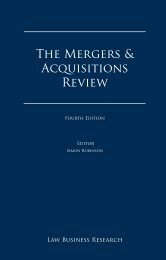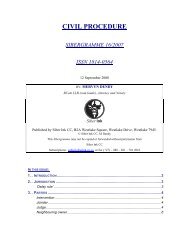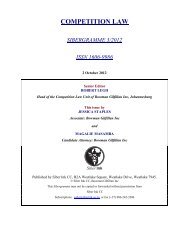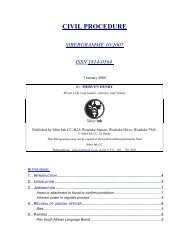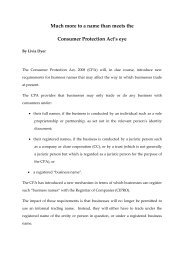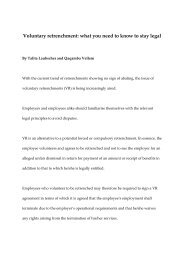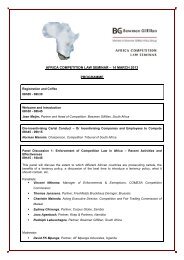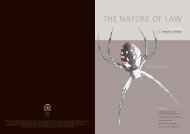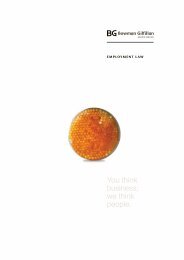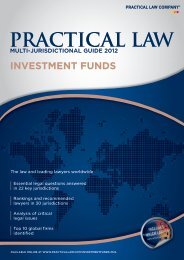SIBERGRAMMES 1 - Bowman Gilfillan Attorneys
SIBERGRAMMES 1 - Bowman Gilfillan Attorneys
SIBERGRAMMES 1 - Bowman Gilfillan Attorneys
- No tags were found...
Create successful ePaper yourself
Turn your PDF publications into a flip-book with our unique Google optimized e-Paper software.
Page 6 ISSN 1814 – 0564 CIVIL PROCEDURE SG 3/2008contemplated in rule 43(1)(b), since the respondent herself had made it clear that she hadno intention whatsoever of instituting divorce proceedings against her husband (at 170c—d, read with 165h—i and 171b—c).4. JURISDICTION‘Specific performance’ in s 46(2)(c) of Act 32 of 1944In Malkiewicz v Van Niekerk and Fourouclas Investments CC [2008] 1 All SA 57 (T)the respondents had each issued summons out of a magistrate’s court against theappellant, claiming an order directing the appellant to remove a boundary wall erected bythe appellant which allegedly encroached on one of the properties of the respondents. Theappellant had raised, in opposition to both claims, identical special pleas relating tojurisdiction, contending that the court had no jurisdiction because there were noalternative claims for damages. The special pleas were clearly based on s 46(2)(c) of theMagistrates’ Courts Act 32 of 1944, which provides as follows:‘A court shall have no jurisdiction in matters –(a) . . .;(b) . . .;(c) in which is sought specific performance without an alternative of payment ofdamages except in –(i) the rendering of an account in respect of which the claim does not exceedthe amount determined by the Minister from time to time by notice in theGazette;(ii) the delivery or transfer of property, movable or immovable, notexceeding in value the amount determined by the Minister from time totime by notice in the Gazette; and(iii) the delivery or transfer of property, movable or immovable, exceeding invalue the amount determined by the Minister from time to time by noticein the Gazette, where the consent of the parties has been obtained interms of section 45;(d) . . . .’The presiding magistrate dismissed the special pleas, holding that the claims were notclaims for the specific performance of a contractual obligation, that s 46 was notapplicable, and that the court could entertain the matter by virtue of s 30(1) of theMagistrates’ Courts Act (which empowers magistrates’ courts to grant interdicts) (at58h—j). The defendant appealed, contending that the respondents’ claims were claims forspecific performance without alternative claims for damages and that s 46(2)(c) precludedthe magistrate’s court from hearing both matters.Since the claims in Malkiewicz clearly did not fall within the ambit of any of the threeexceptional situations adumbrated in subparagraphs (i), (ii) and (iii) of s 46(2)(c), thevalidity or otherwise of the appellant’s special pleas turned on the proper meaning of theexpression ‘specific performance’ in that provision. If ‘specific performance’ meant nomore than ‘specific performance’ due in terms of a contract, then the claimsPage 6 of 16 § Civil Procedure SG 3/2008© Siber Ink CC, M DendyThis Sibergramme may not be copied or forwarded without permission fromSiber Ink CC



